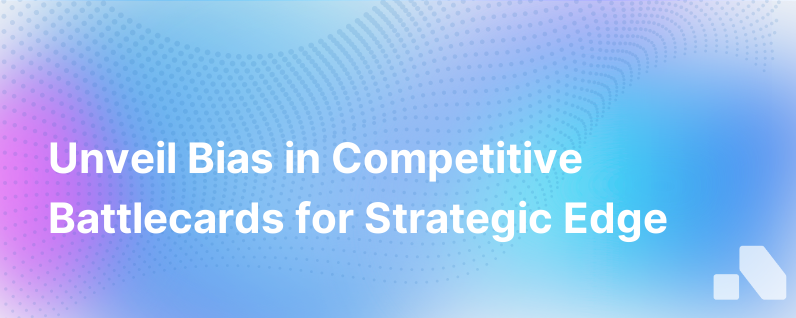
The role of a battlecard in any sales or marketing strategy is significant. It sets the stage for effective engagement with competitors. Battlecards enable sales teams to draw clear differentiators, counter objections, and have structured responses ready for any competitive situation.
However, the efficacy of a battlecard lies in its accuracy and unbiased content, both of which can become compromised due to a prevalent issue known as Competitive Battlecard Bias.
In this article, we will dissect the concept of Competitive Battlecard Bias, underscore its consequences, and outline strategies to mitigate it.
Understanding Competitive Battlecard Bias
Competitive Battlecard Bias arises when the information about competitors in your battlecards is skewed. It's common to emphasize your company's strengths while underplaying or ignoring the areas where competitors might have the upper hand. This leads to a bias that can be counterproductive for your sales and marketing teams and ultimately, your bottom line.
How Battlecard Bias Undercuts Your Efforts
Inaccurate or biased battlecards can harm your organization in several ways. Firstly, they risk misguiding your sales team who rely on these battlecards for crucial competitive insights. If your sales team stumbles upon a superior offering by your competitor during their pitch, it may lead to a lost deal or decreased credibility.
Secondly, biased battlecards often lead to devaluation of competition, resulting in complacency. This prevents your organization from spotting gaps in your offerings or proactively adapting to market trends.
Thirdly, when your sales representatives are using biased battlecards, they can come across as dismissive or arrogant to potential clients. This may drive customers away.
Strategies for Building Unbiased Battlecards
To build useful, comprehensive, and unbiased battlecards, follow these strategies:
1. Consider External Perspectives: Relying solely on internal knowledge for competitive analysis can lead to tunnel vision. Incorporate external resources and third-party input to validate your assessments. Encourage multi-department involvement in the process, including sales, product development, and customer success teams.
2. Use Structured Data Collection: Having a structured approach to data collection can reduce biases and ensure neutrality. Make it a routine to gather information from multiple credible sources.
3. Foster a Culture of Honesty: Encourage honest discussions about your competitors. Admitting to their strengths helps you understand where you stand and what differentiates you, better preparing your teams to tackle objections.
4. Continuously Update Battlecards: Battlecards aren't a one-time activity. Continuously update them with emerging players, evolving features, and shifting trends.
5. Implement Regular Audits: Regularly audit your battlecards. This ensures they remain accurate and impartial. A third-party audit can be particularly valuable to identify and correct subtle biases that internal reviewers might overlook.
Leveraging Tech to Combat Battlecard Bias
Advancements in artificial intelligence and machine learning offer promising solutions in the battle against bias. Platforms like Aomni perform tailored research using AI, providing unbiased, real-time competitive insights.
Such tools aggregate account data, synthesize it into actionable battlecards, and update it continuously based on evolving trends and user feedback. They eliminate the manual effort required to gather and verify information, freeing your teams to focus on strategy execution.
Conclusion
Building effective, unbiased battlecards is a continuous journey of data gathering, honest evaluation, and consistent revision. By acknowledging and addressing Competitive Battlecard Bias, you can equip your sales team with realistic, balanced, and compelling narratives which resonate with clients and nip competitor objections in the bud.
Moreover, through leveraging cutting-edge solutions like Aomni, your organization can streamline the battlecard creation process. Not only will this make your team more informed and competitive, but also inspire confidence amongst stakeholders that they are well-equipped to face any sales challenge.
Remember, it's not about painting your product or service as superior in every regard; it's about knowing the landscape and showcasing why you're the best-fit solution for your prospect.